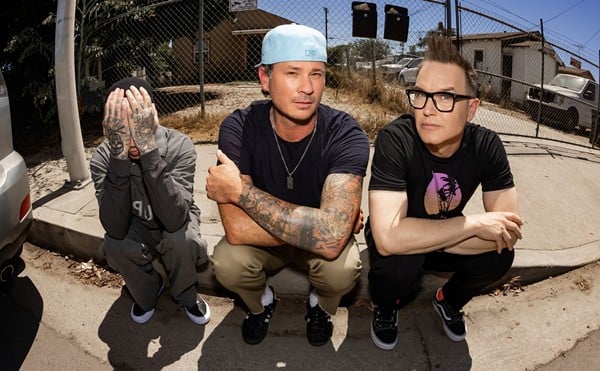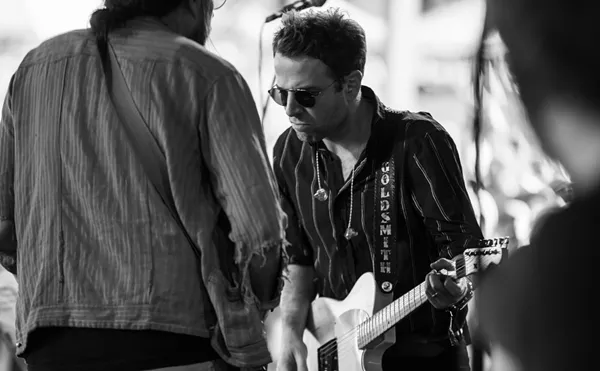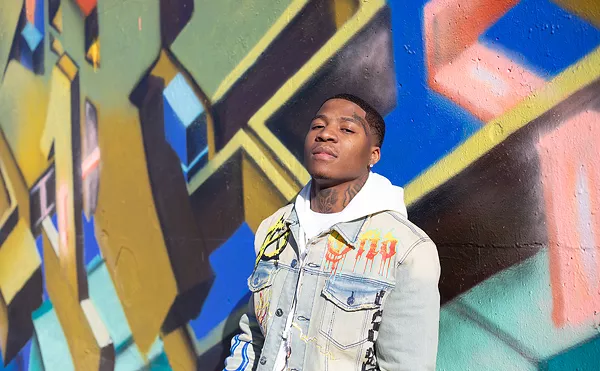You may not know him by name, but chances are, Dominic Miller's work features heavily in your music collection. The Buenos Aires-born guitarist started making a name for himself as a session player in the '80s, first as a member of Karl Wallinger's World Party and then as a studio ringer for acts such as Level 42, Phil Collins, the Pretenders and Paul Young. He quickly caught the attention of erstwhile Police frontman Sting, who made Miller part of his band for 1991's The Soul Cages. That's where Miller has remained for almost twenty years, while maintaining his busy session schedule, appearing on Sting's many solo albums and cowriting a number of his songs, including the hit "Shape of My Heart."
This is a particularly busy time for Miller: Not only has he just hit the road with Sting for the Symphonicity tour — which adds a 45-piece orchestra to Sting's greatest hits — but he's also doing select dates to promote his own new solo project, November, which finds him setting aside his nylon-stringed acoustic guitar and going electric. In the midst of all this activity, Miller found a few moments to talk to the RFT about his solo career, why Sting is taking his greatest hits on the road again and why orchestral musicians are more rock & roll than you might think. For more of this interview, head to www.rftmusic.com.
Jeff Giles: I've been following your Twitter feed, and I'm exhausted just from looking at it. All that travel, two shows in one night — how are you staying conscious?
Dominic Miller: Yeah, I haven't been home, really, for about two months. But this is what I chose, you know. Be careful what you wish for. I'm just going for it, you know? I'm at a stage in my life where I'm just letting it take me, and I'm very, very fortunate to be in the position that I'm in, and I want to keep it going.
The Symphonicity tour kicked off a few weeks ago in Vancouver. How did the first show feel?
It was a great show. I mean, there were a few mistakes here and there, and it's a little difficult doing the first show, because we're all a bit nervous — Are we good enough? Is this for real? — so there was a bit of tension there. But that's quite a good energy to have. I think the audience loved it, and we can see where we can improve. It's just going to get better.
Now, you've done some work with an orchestra on your own.
Yeah, I did that a long time ago, when I did my classical album. Which was pretty intimidating. I think there was a lot more pressure on me for the solo project. And I felt a lot more detached from them, because I didn't have the luxury of spending a lot of time working with them for weeks on end, which we've done with Sting. With Sting, we've utilized the orchestra kind of like another instrument, and I couldn't do that for my album. It was quite scary, but it was quite fulfilling in the end. That was the English Chamber Orchestra I worked with; they're amazing. But after awhile, you realize we're all just musicians. I mean, orchestral musicians are not the same as they were twenty years ago. They're much more integrated into pop and jazz. I love working with them.
No one showing up for rehearsal in a dinner jacket?
No, no, certainly not. You know, the funny thing is, I think orchestral musicians are much more rock & roll than rock & rollers are. We're all drinking mineral water and doing yoga, and they're getting fucked up!
How would you describe your role onstage in this tour? How is it different from past tours?
In many ways, it's completely different — and in many ways, it's completely the same. I mean, I've been working with Sting for twenty years, and I suppose I'm kind of his lieutenant, in a way. I kind of know what his big picture is, and I can transmit that to some of the other musicians. My role, really, is to make his songs sound good. I understand the harmony of his music better than probably most people on that stage, so I contribute and help all the musicians and the conductor.
I'm not a specialist in any given style, and I think that's why it works, because I'm a bit of an all-'rounder. There are a lot of guitarists, certainly, who could kick my butt in certain areas — I'm not a classical, jazz, funk, rock or heavy-metal guitarist. But I know a little about all these genres to be able to get away with it and understand the role. That's what I'm doing here, and I'm not doing anything different to what I'd be doing if we were playing with a four-piece band — it's just music. We're just utilizing the orchestra as another element in the band — one that happens to be 45 people.
I imagine it must add a few logistical wrinkles to the show.
Oh, sure! I mean, I shudder to think what this must be costing. I know that the ticket price must be pretty high, but they're certainly going to get their money's worth. Sting is investing a lot in this — he's at a point in his career where he could just play some rock & roll and make a ton of money. He's taking a big career risk, you know, and that's what I like about it. I stand behind him 100 percent.
It's interesting that you describe it as a risk, because it would be easy to look at Sting's recent career path — the Police reunion, the lute record, the Christmas album and now this — and conclude that it's an unusually backward-looking time for him as an artist. The obvious question is: Why an orchestral project now? Why rehash the greatest hits one more time?
Well, the answer to that is that it's the same reason dogs lick their balls.
Because they can.
Yeah. You know what I mean? Why not? It's just a progression, and I'm proud of him for doing this. I mean, between you and me and your readers, I don't mind saying that some of his career choices have been questionable. But more power to him! He's happy doing what he's doing, which is the main thing, and he's taking risks — he's not just doing the same thing every day, which is what a lot of his contemporaries are doing. I think Sting is becoming a better musician as a result of doing all this stuff. I mean, if he hadn't done the lute album or the winter album, he wouldn't be where he is now. I'm sure at some point, he'll get back to rock & roll, but he will have accrued a wealth of experience by doing this, and he'll bring that to the table.
Watching the electronic press kit for the Symphonicity project, I was struck by how much it was stressed that Sting didn't want this to be just another "pops" concert and how much care was given to coming up with new arrangements for these songs. How involved were you in that process?
Well, not at all, really. I'm a sideman, you know. I'm a guitarist, and I understand my role. I think I had something to say about some of the arrangements — I felt they were slightly overcooked. I was of some assistance in that regard, to make some of them less obvious. I think some of the arrangements picked up on Sting's subtleties, and it's been my goal to help the orchestra do more of that, to not say too much whilst saying a lot. But, you know, I didn't have much input. Sting handed his songs over to some very experienced arrangers, and they did their interpretations of his songs. All we did was work around those interpretations and kind of mess with them. The music makes me think that when some of those arrangers come to see the show, they won't recognize them. I'm hoping that will be the case!
The orchestral album comes out in July. How quickly did those recordings come together in the studio?
Oh, quickly. Three or four days. I think they're doing a bit of mixing now, but when you've got an orchestra, you can't mess around. You just lay it down and roll tape. I mean, in general, making records these days — it's no longer about just going into the studio and having a big love-in. It doesn't work like that anymore. Just go in, play some music, and document it. Quick-quick.






